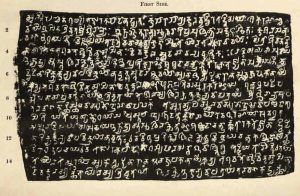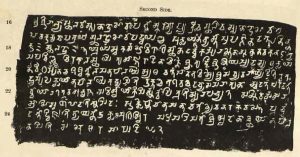
Baigram charter of Kumāramatya Kulavṛddhi, first side.

Baigram charter of Kumāramatya Kulavṛddhi, second side.
[LI. 1—3] Bliss! From Pañchanagari Kumārāmātya Kulavṛiddhi, who meditates on the feet of the Bhaṭṭāraka (i.e., the king). Informs after enquiring about their health. The adhikaraṇa (court) of the vishaya and the village-householders along with the Brāhmaṇas and others and the Chief-officers (Samvyavahārins) of (the two localities named) Trivṛitā and Śrīgōhālī connected with the village named Vāyigrāma.
[LI. 3—6] Bhōyila and Bhāskara, two family headmen residing in this locality. thus apply.—The (building) of the temple of Lord Gōvindasvāmin founded by Śivanandin, father of us both, is poorly endowed. In this vishaya prevails (the procedure) of sale at the rate of two dīnāras for each kulyavāpa of shrubless fallow fields, which do not yield any revenue (to the State), (the lands being purchased) in accordance with the principle of perpetual endowment to be enjoyed for all time to come as long as the moon, the sun and the stars endure, and free from (the liability of payment of) any kind of taxes.
[LI. 6—10] So deign to make a grant to (me). Bhōyila. of three kulyavāpas of khila (i.e., waste) land in Trivṛitā and one drōṇavāpa of vāstu (i.e., homestead) land, for (dwelling) site (tala) and paths (vāṭaka) in Śrīgōhālī. and to (me), Bhāskara, one drōṇavāpa of homestead land for the purpose of repairs to the temple of Lord Gōvindasvāmin when damaged or dilapidated and for the performance of the daily worship with perfumery, incense, lamp and flowers, by getting from us an income of six dīnāras and eight (silver) coins.
[LI. 10—13] Since we inform von that it has been determined by the record-keepers, Durgādatta and Arkkadāsa (thus).—there exists in this rishaya (the procedure of) sale at the rate of two dīnāras for each of shrubless fallow fields, which are beyond the possibility of yielding revenue (to the king), to be enjoyed for all time to come as long as the moon, the sun and the stars endure. Moreover, there can be no objection (out of fear of any loss) on the king’s behalf in the matter of such sale of khita fields, free from taxes: (rather) there is (possibility of) some income for the Bhaṭṭāraka-pūda (or the king) and also of the acquisition of one-sixth of the religious merit (accruing from such an act). Hence the (land) should be given (by sale).
[Li. 13—18] Thus on making an income of six dīnāras and eight (silver) coins (rūpakas) from Bhōyila and Bhāskara for the sake of the temple of Lord Gōvindasvāmin, three kulyavāpas of khila fields in Trivṛitā and one drōṇavāpa of vāstu land in Śrīgōhālī were granted (by sale) to Bhōyila and one drōṇavāpa of vāstu land in the verv same place (i.e., Śrīgōhālī) to Bhāskara, by the execution of a copper-plate (charter) in accordance with the principle of perpetual endowment (akshayanīvī), thus the total measurement of land (sold) being three kulyavāpas and two sthala- drōṇavāpas (stated in figures as ka 3 and sthaladrō 2, respectively).
[LI. 18—21] (So) you shall make over (to the two applicants the portion of land) by fixing their boundaries on four sides with marks of chaff and charcoal which will be permanent, after having defined (the area) by the measurement of 8 9 reeds by the lands of Darvvīkarmma, in places which have no conflict with your own agricultural work, and shall preserve it for all time to come by the principle of perpetual endowment. The present and the future administrative agents and others also should preserve it out of regard for religious merit.
[LI. 21—25] (Here follow three imprecatory stanzas.)
[L. 23] (Here the charter) ends. The year (saṃ) 128, the 19th day of Māgha.